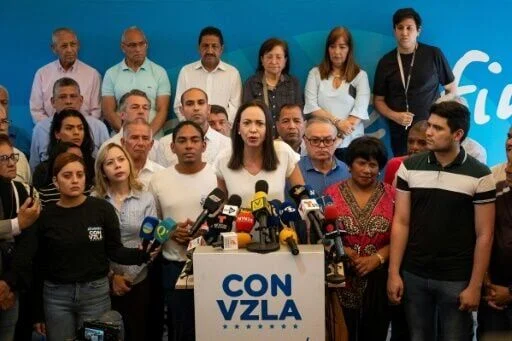Caracas: Venezuela’s main opposition coalition said on Tuesday it had managed to register a proxy candidate to take on President Nicolás Maduro in the country’s July election – but not the one it wanted.
With popular leader Maria Corina Machado barred from public office, the plan was to register another replacement candidate, 80-year-old university professor Corina Yoris. However, at midnight on Monday, the coalition was blocked from doing so.
The National Electoral Council (CNE) on Tuesday published the surprising name of Edmundo Gonzalez Urruti, a political scientist and former ambassador, as the candidate of the Democratic United Platform (PUD).
The coalition said in a statement that his candidacy was “provisional … due to the clear impossibility of registering the selected candidate so far.”
The United States and Brazil were among several nations that expressed concern after the coalition was unable to register Yoris.
Maduro, 61, is seeking to extend his tumultuous decade in power for a third six-year term, amid growing fears of his slide into authoritarianism and crackdown on dissent.
“What we have been warning about for many months is over: the regime has chosen its (opposition) candidates,” Machado told a news conference.
While Machado overwhelmingly won opposition primaries last year, Maduro-loyal courts barred her from public office for 15 years on corruption charges that were widely believed to be false and for supporting Western sanctions against the government.
Another opposition representative, veteran politician Manuel Rosales, also managed to register. Maduro’s socialist government sees him as a more acceptable opponent.
Also read: Australia battles to save last 11 wild ‘earless dragons’
Rosales, of the Un Nuevo Tiempo (UNT) party, said he decided to register as a candidate to “open the space for Venezuelans to vote”.
He said the alternative was to “abstain and let (President Nicolas) Maduro stay there for another six years without doing anything else.”
With opinion polls putting Maduro’s approval rating between 15 and 20 percent, analysts say dividing the opposition will be key to his victory.
“Maduro knows he is losing to any opposition candidate who achieves unity and raises the spirit of civic participation,” political analyst Yoel Lugo told AFP.
“The worst case scenario for the opposition is to maintain a tone of internal tension.”
Maduro faced criticism from the international community for meddling in the election after his government and the opposition struck a deal in Barbados last year to hold a free and fair vote with international observers present.
The White House said it was “deeply concerned” by the decision to block Yoris.
“It is essential that the Maduro regime recognize and respect the right of all candidates to run,” White House spokeswoman Karine Jean-Pierre told reporters.
The UN chief deplores “any development that could hinder electoral guarantees”, said Farhan Haq, a spokesman for Secretary-General Antonio Guterres.
Buenos Aires said on Tuesday that concerns among Venezuelan anti-Maduro activists were underscored by several members of the opposition at the Argentine ambassador’s residence in Caracas.





















